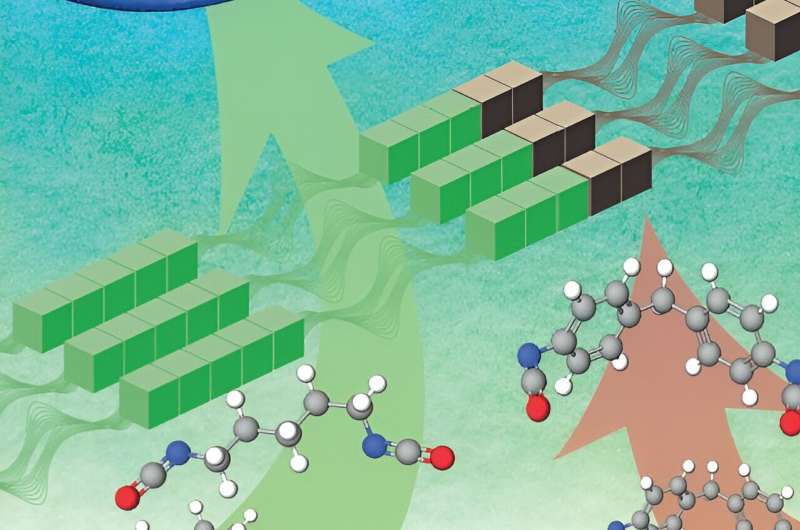This article has been reviewed according to Science X's editorial process and policies. Editors have highlighted the following attributes while ensuring the content's credibility:
fact-checked
peer-reviewed publication
proofread
Polyurethane is widely used in daily life, so eco-friendly synthesis boosts utilization

Senior Researcher Lim Sang-gyu, leading a team of researchers at the Department of Energy Convergence Research, DGIST, achieved a remarkable milestone with the development of an eco-friendly thermoplastic polyurethane boasting a staggering biocarbon content of 97%.
This groundbreaking technology, created in collaboration with Jung Jae-hoon from the New Product Development Team and Jeon Cho-hyun from the New Business Planning Team at the Korea Textile Development Institute (KTDI), holds immense significance as it presents a sustainable alternative to conventional petroleum-based thermoplastic polyurethanes.
Thermoplastic polyurethane is a remarkable material renowned for its outstanding mechanical properties, including abrasion resistance, resilience, tensile strength, and tear strength. Its versatility makes it widely used in various life and industrial applications such as industrial sheets, screen protection films, cases, footwear, artificial leather, and apparel materials.
Currently, the majority of thermoplastic polyurethanes are synthesized using petroleum-based polyols, isocyanates, and diols. Despite their exceptional properties, the extraction, manufacturing, use, and disposal of petroleum-based raw materials contribute to environmental pollution. This has spurred worldwide efforts to explore eco-friendly alternatives based on biomass materials. However, developing biomass-based products that can match the properties of conventional thermoplastic polyurethanes presents significant challenges.
In a remarkable collaboration with the KTDI, Lim's research team achieved a significant breakthrough by developing an eco-friendly thermoplastic polyurethane. To synthesize this environmentally friendly material, they utilized biomass-based polyester polyols and butane diols, moving away from traditional petroleum-based materials.
The resulting biomass-based thermoplastic polyurethane exhibits exceptional properties, including a remarkable biocarbon content of up to 97%, a weight average molecular weight of approximately 120,000 g/mol, a tensile strength of 20 MPa, and an impressive tensile elongation of 587.2%.
Remarkably, these properties are comparable to those of existing petroleum-based thermoplastic polyurethanes, making the developed material a versatile candidate for a wide array of applications in both daily life and various industries. The eco-friendly thermoplastic polyurethane is expected to find use in diverse fields, such as industrial sheets, screen protection films, cases, footwear, artificial leather, and clothing materials.
Researcher Lim highlighted that "to differentiate their research from existing studies on eco-friendly thermoplastic polyurethanes, they meticulously evaluated the chemical, thermal, and mechanical properties of biomass-based aliphatic isocyanates, varying their content ratio. These properties were then compared with those of petroleum-based thermoplastic polyurethanes."
With optimism, he expressed hopes for the commercialization and widespread use of the biomass-based thermoplastic polyurethanes developed through their research, particularly in various fields of high-functional fiber materials.
The study is published in the Journal of Applied Polymer Science.
More information: Jiyeon Oh et al, Synthesis and characterization of improved bio‐based carbon content thermoplastic polyurethane with bio‐aliphatic and petro‐aromatic diisocyanate, Journal of Applied Polymer Science (2023). DOI: 10.1002/app.54088
Journal information: Journal of Applied Polymer Science
Provided by DGIST (Daegu Gyeongbuk Institute of Science and Technology)




















